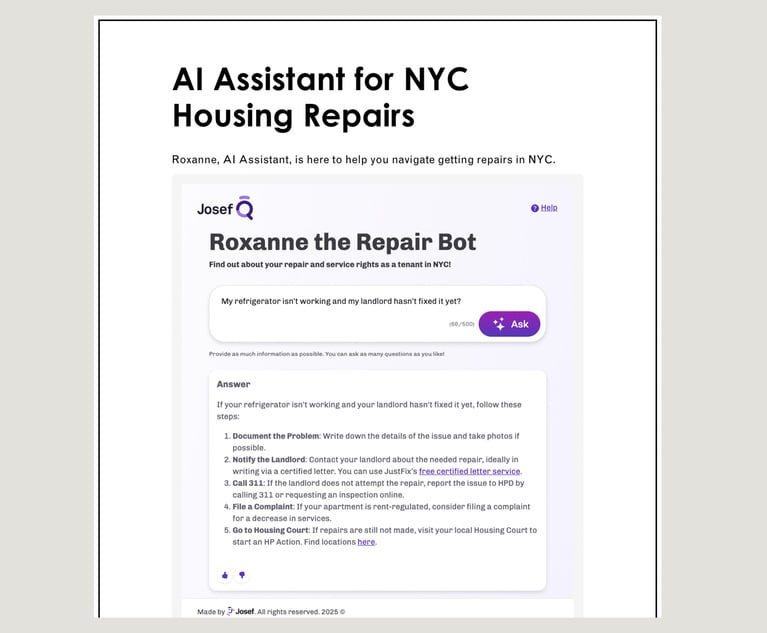Second Circuit, Too, Refuses to Intercede in DACA Suits
The appellate panel found the government's arguments that the courts can't review its agency decisions unpersuasive, while eyeing recent actions in similar cases before the Ninth Circuit and the U.S. Supreme Court.
December 28, 2017 at 03:58 PM
5 minute read
 U.S. Court of Appeals for the Second Circuit.
U.S. Court of Appeals for the Second Circuit.
For the second time, a federal appellate court has refused to intercede in proceedings against the Trump administration's wind-down of the Obama-era Deferred Action for Childhood Arrivals immigration program.
On Wednesday, the U.S. Court of Appeals for the Second Circuit joined its sister circuit in California in refusing to grant the government's mandamus petition. Government lawyers had argued before the panel of Circuit Judges Barrington Parker, Gerard Lynch and Christopher Droney that the district court orders by U.S. District Judge Nicholas Garaufis of the Eastern District of New York to provide more documentation connected to the decision-making process around DACA overstepped the court's authority.
In its opinion, the panel rejected the government's argument, finding that the government's two-fold argument—that it cannot be ordered to supplement the administrative record or produce a privilege log for materials withheld—was unpersuasive.
The government does not get to unilaterally decide which materials to present to the court. To do so “would impede the court from conducting the 'thorough, probing, in-depth review' of the agency action with which it is tasked, the panel found, quoting from the U.S. Supreme Court's 1971 decision in Citizens to Preserve Overton Park v. Volpe.
The district court appeared to have good reason to demand more records disclosure, the panel said. It pointed to the action in the Northern District of California that saw that court, faced with a parallel DACA suit, disqualify four dozen supplemental documents the government claimed privilege over after in camera review. Likewise, 200 of the 256 pages that were submitted consisted of previously published opinions from various federal courts.
“It is difficult to imagine that a decision as important as whether to repeal DACA would be made based upon a factual record of little more than 56 pages, even accepting that litigation risk was the reason for repeal,” the panel stated, alluding to a core argument the government advanced regarding the reasoning behind the DACA wind-down.
The government's contention that producing deliberative documents, which would inappropriately probe the mental process of an agency, was justification, in part, for not producing a privilege log also fell flat with the panel. The possibility that there may be deliberative documents “does not necessarily mean that they were properly excluded,” and without a privilege log “the district court would be unable to evaluate the government's assertions of privilege,” the panel found.
The panel made clear it had on its mind the recent remand by the Supreme Court to have the California district court further handle threshold issues presented by the government prior to dealing with how broad or narrow the administrative record needed to be.
The panel in the Second Circuit said that, contrary to the government's argument that the decision bolstered its arguments, the Supreme Court's order simply set the California courts on a path that the New York district court had already traversed, having already ruled that the court had discretion to review the DACA decision.
Further, the panel noted the issues being dealt with in New York “are significantly distinguishable from those in the California case.” For example, the document request in California “appears to cover a far larger universe of documents than the contested orders before this court,” including information from the White House. Likewise, the order for a privilege log in the New York district court ahead of demanding any documents the government asserts privilege over appeared to address another concern formulated by the Supreme Court in its order remanding the case in California.
“The order [in the New York district court] thus plainly contemplates an orderly resolution of any claims of privilege, and we are confident that the district court will provide the government with an opportunity to be heard on any,” the panel stated.
The panel lifted the stays in place on action before Garaufis.
Deputy Assistant U.S. Attorney General Hashim Mooppan led the government's response on appeal. Devin O'Malley, a spokesman for DOJ, said in a statement that the department “continues to maintain that the discovery order in the DACA litigation is dramatically intrusive and premature.”
“We are reviewing the Second Circuit's decision and are deciding next steps,” O'Malley said.
National Immigration Law Center attorney Joshua Rosenthal, and New York Deputy Solicitor General Anisha Dasgupta, argued on behalf of the twin suits proceeding in the Second Circuit—Batalla Vidal v. Baran, 16-cv-4756, and State Of New York v. Trump, 17-cv-05228—respectively.
Amy Spitalnick, a spokeswoman for New York Attorney General Eric Schneiderman's office, said in a statement, “We welcome the court's decision and look forward to pursuing our case to protect DACA grantees and New York's best interests.”
A spokesperson for the National Immigration Law Center could be reached.
This content has been archived. It is available through our partners, LexisNexis® and Bloomberg Law.
To view this content, please continue to their sites.
Not a Lexis Subscriber?
Subscribe Now
Not a Bloomberg Law Subscriber?
Subscribe Now
NOT FOR REPRINT
© 2025 ALM Global, LLC, All Rights Reserved. Request academic re-use from www.copyright.com. All other uses, submit a request to [email protected]. For more information visit Asset & Logo Licensing.
You Might Like
View All
Meet the Long Island Judge Tapped to Be US Attorney for Eastern District of New York
2 minute read
New York’s Property Tax Incentives and Abatements Make Development Feasible
7 minute read
Josef Partners With NYU, Housing Court Answers to Launch AI Assistant Built for Tenants

Trending Stories
Who Got The Work
Michael G. Bongiorno, Andrew Scott Dulberg and Elizabeth E. Driscoll from Wilmer Cutler Pickering Hale and Dorr have stepped in to represent Symbotic Inc., an A.I.-enabled technology platform that focuses on increasing supply chain efficiency, and other defendants in a pending shareholder derivative lawsuit. The case, filed Oct. 2 in Massachusetts District Court by the Brown Law Firm on behalf of Stephen Austen, accuses certain officers and directors of misleading investors in regard to Symbotic's potential for margin growth by failing to disclose that the company was not equipped to timely deploy its systems or manage expenses through project delays. The case, assigned to U.S. District Judge Nathaniel M. Gorton, is 1:24-cv-12522, Austen v. Cohen et al.
Who Got The Work
Edmund Polubinski and Marie Killmond of Davis Polk & Wardwell have entered appearances for data platform software development company MongoDB and other defendants in a pending shareholder derivative lawsuit. The action, filed Oct. 7 in New York Southern District Court by the Brown Law Firm, accuses the company's directors and/or officers of falsely expressing confidence in the company’s restructuring of its sales incentive plan and downplaying the severity of decreases in its upfront commitments. The case is 1:24-cv-07594, Roy v. Ittycheria et al.
Who Got The Work
Amy O. Bruchs and Kurt F. Ellison of Michael Best & Friedrich have entered appearances for Epic Systems Corp. in a pending employment discrimination lawsuit. The suit was filed Sept. 7 in Wisconsin Western District Court by Levine Eisberner LLC and Siri & Glimstad on behalf of a project manager who claims that he was wrongfully terminated after applying for a religious exemption to the defendant's COVID-19 vaccine mandate. The case, assigned to U.S. Magistrate Judge Anita Marie Boor, is 3:24-cv-00630, Secker, Nathan v. Epic Systems Corporation.
Who Got The Work
David X. Sullivan, Thomas J. Finn and Gregory A. Hall from McCarter & English have entered appearances for Sunrun Installation Services in a pending civil rights lawsuit. The complaint was filed Sept. 4 in Connecticut District Court by attorney Robert M. Berke on behalf of former employee George Edward Steins, who was arrested and charged with employing an unregistered home improvement salesperson. The complaint alleges that had Sunrun informed the Connecticut Department of Consumer Protection that the plaintiff's employment had ended in 2017 and that he no longer held Sunrun's home improvement contractor license, he would not have been hit with charges, which were dismissed in May 2024. The case, assigned to U.S. District Judge Jeffrey A. Meyer, is 3:24-cv-01423, Steins v. Sunrun, Inc. et al.
Who Got The Work
Greenberg Traurig shareholder Joshua L. Raskin has entered an appearance for boohoo.com UK Ltd. in a pending patent infringement lawsuit. The suit, filed Sept. 3 in Texas Eastern District Court by Rozier Hardt McDonough on behalf of Alto Dynamics, asserts five patents related to an online shopping platform. The case, assigned to U.S. District Judge Rodney Gilstrap, is 2:24-cv-00719, Alto Dynamics, LLC v. boohoo.com UK Limited.
Featured Firms
Law Offices of Gary Martin Hays & Associates, P.C.
(470) 294-1674
Law Offices of Mark E. Salomone
(857) 444-6468
Smith & Hassler
(713) 739-1250






